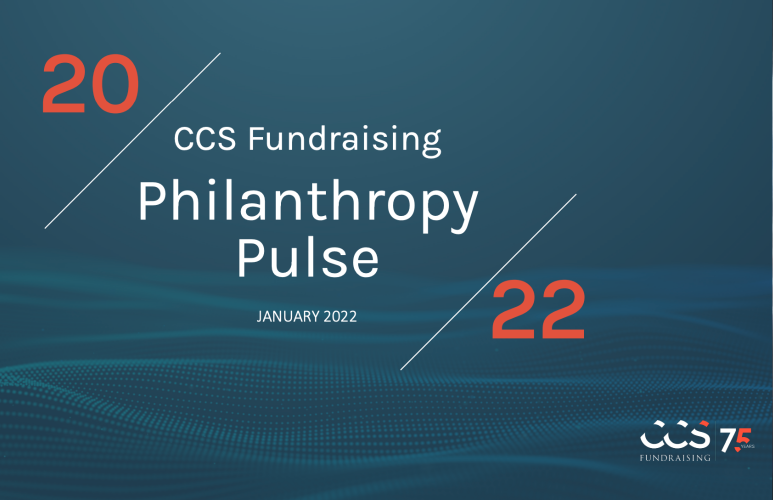Nonprofit leaders anticipate a strong 2022 fundraising year, with 70% having resumed face-to-face donor meetings or events as of November 2021, and a like percentage (69%) anticipating a bump in major gifts, according to Philanthropy Pulse, a report from New York City-based strategic consulting firm CCS Fundraising.
Respondents cited family foundations and donor-advised funds as the sources that loosened their purse strings during the past two years, with 81% of the former and 80% of the latter doing so. Other funding sources that showed growth included appreciated assets, which was mentioned by 61%, bequests (57%) and retirement plans (46%).
Going forward, 69% of respondents anticipate major gifts will increase as a source of donations during 2022, with only 7% predicting declines in major gifts. Just under two-thirds (64%) foresaw increases in mid-level gifts, with a scant 2% anticipating a drop. Other channels seen as upping their contributions included annual appeals (61%), deferred gift commitments (56%) and membership (56%).
Some funding sources were more likely to be seen as cutting their magnanimity. Government grants were the source most likely to be scaled back, with 21% of respondents anticipating reductions and only 29% foreseeing increases. Another 14% indicated events, despite some organizations ramping up their efforts from recent levels, would still see revenue declines. And 10% said membership fees, as institutions face sporadic openings and consumers have increased competition for their money, would also decline.
Organizations are not passively waiting for good fortune to fall into their laps. Nearly two-thirds (64%) reported some form of major capital or comprehensive campaign, whether planning, starting, restarting or continuing such efforts. And next-wave coronavirus concerns aren’t going to curtail in-person meetings: nearly one in five nonprofits have completely resumed these activities, more than half (53%) of the organizations surveyed have partly restarted them and most of the rest will resume them in the first half (16%) or the second half (6%) of 2022.
That said, the pandemic has made lasting changes to the way organizations operate. More than six in 10 (61%) indicated virtual events are here to stay, and slightly more than half (55%) will continue to offer part-time or occasional remote work schedules. The boosts in digital operations will continue as well, with 49% pushing digital giving, a like percentage maintaining an enhanced social media presence, and 42% going forward with virtual gift request. Just over one-third (36%) say the enhanced personalized communication strategies they implemented as a result of the pandemic will continue.
The heightened awareness of diversity, equity and inclusion (DEI) initiatives is reflected in nonprofits’ fundraising activities. Currently, 62% of respondents make DEI part of their strategic plans for fundraising, and another 28% have plans to do so. Organizations are not keeping DEI concerns to themselves, either, with 58% “always” or “frequently” discussing these issues with their donors, and another 33% responding that they “often” do.
Nonprofit DEI activities include making changes to board recruitment or relations practices, as cited by 52% of respondents. Just under half (49%) offer DEI training to fundraising staff and/or board members and 46% have modified their messaging or presentations to reflect their support for DEI. Just under one-third (32%) have made changes to staffing or leadership structures that reflect DEI issues.
That said, fundraising staff have more education or training needs than just DEI issues. When those surveyed were asked to consider several fundraising concerns, only 36% said their staff were “completely” or “mostly” knowledgeable about major gift planning, and just under half (48%) were completely or mostly knowledgeable about prospect research. The skills on which fundraising staff scored highest include event planning, with 83% of respondents indicating their staff was completely or mostly knowledgeable about, and board relations (often board members themselves are urged to fundraise), for which 77% of fundraising staff were completely or mostly knowledgeable.
Findings are based on responses from representatives of 877 organizations. Responses were gathered during October and November 2021. A full copy of the report is available here.
